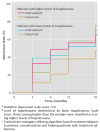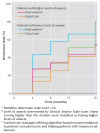Remission in depressed geriatric primary care patients: a report from the PROSPECT study
- PMID: 15800144
- PMCID: PMC2803683
- DOI: 10.1176/appi.ajp.162.4.718
Remission in depressed geriatric primary care patients: a report from the PROSPECT study
Abstract
Objective: This study compared time to first remission for elderly depressed patients in primary care for practices that implemented a care management model versus those providing usual care. In addition, it sought to identify risk factors for nonremission that could guide treatment planning and referral to care managers or specialists.
Method: Prevention of Suicide in Primary Care Elderly: Collaborative Trial (PROSPECT) data were analyzed. Participants were older patients (> or =60 years) selected following screening of 9,072 randomly identified primary care patients. The present analysis examined patients with major depression and a 24-item Hamilton Depression Rating Scale score of 18 or greater who were followed for at least 4 months (N=215). Primary care practices were randomly assigned to offer the PROSPECT intervention or usual care. The intervention consisted of services of trained care managers, who offered algorithm-based recommendations to physicians and helped patients with treatment adherence over 18 months.
Results: First remission occurred earlier and was more common among patients receiving the intervention than among those receiving usual care. For all patients, limitations in physical and emotional functions predicted poor remission rate. Patients experiencing hopelessness were more likely to achieve remission if treated in intervention practices. Similarly, the intervention was more effective in patients with low baseline anxiety.
Conclusions: Longitudinal assessment of depression, hopelessness, anxiety, and physical and emotional functional limitations in depressed older primary care patients is critical. Patients with prominent symptoms or impairment in these areas may be candidates for care management or mental health care, since they are at risk for remaining depressed and disabled.
Figures



References
-
- Paykel ES, Ramana R, Cooper Z, Hayhurst H, Kerr J, Barocka A. Residual symptoms after partial remission: an important outcome in depression. Psychol Med. 1995;25:1171–1180. - PubMed
-
- Judd LL, Akiskal HS, Maser JD, Zeller PJ, Endicott J, Coryell W, Paulus MP, Kunovac JL, Leon AC, Mueller TI, Rice JA, Keller MB. Major depressive disorder: a prospective study of residual sub-threshold depressive symptoms as predictor of rapid relapse. J Affect Disord. 1996;50:97–108. - PubMed
-
- Thase ME, Entsuah AR, Rudolph RL. Remission rates during treatment with venlafaxine or selective serotonin reuptake inhibitors. Br J Psychiatry. 2001;178:234–241. - PubMed
-
- Whyte EM, Dew MA, Gildngers A, Lenze EJ, Bharucha A, Mulsant BH, Reynolds CF., III Time course of response to antidepressants in late-life major depression: therapeutic implications. Drugs Aging. 2004;21:531–554. - PubMed
-
- Fortney J, Rost K, Zhang M. A joint choice model of the decision to seek depression treatment and choice of provider sector. Med Care. 1998;36:307–320. - PubMed
Publication types
MeSH terms
Grants and funding
- P30 MH066270/MH/NIMH NIH HHS/United States
- R01 MH059380/MH/NIMH NIH HHS/United States
- R01 MH-59318/MH/NIMH NIH HHS/United States
- R37 MH051842/MH/NIMH NIH HHS/United States
- R01 MH-59366/MH/NIMH NIH HHS/United States
- P30 MH068638/MH/NIMH NIH HHS/United States
- R01 MH-059380/MH/NIMH NIH HHS/United States
- P30 MH-68638/MH/NIMH NIH HHS/United States
- R01 MH059366/MH/NIMH NIH HHS/United States
- P30 MH-066270/MH/NIMH NIH HHS/United States
- R037 MH-51842/MH/NIMH NIH HHS/United States
- P30 MH-52247/MH/NIMH NIH HHS/United States
- P30 MH052247/MH/NIMH NIH HHS/United States
LinkOut - more resources
Full Text Sources
Medical

